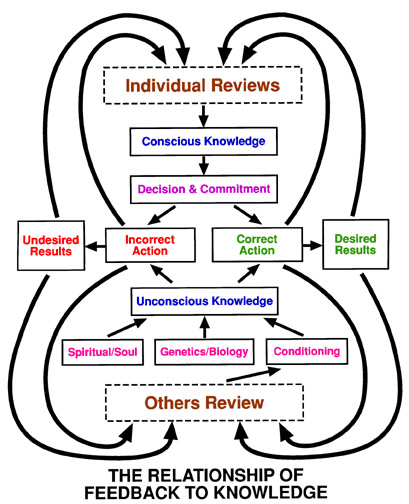Have you ever had the experience of being more motivated to keep trying when someone says you’re doing a good job, but when you’re criticized, your mood drops and you even start to doubt your ability to do things? Or, when you try to do something, but do not get any response, will become less attached to it?
All of these situations, in fact, can be attributed to a concept in psychology – Feedback Effect (Feedback Effect). Today we will understand what this phenomenon is all about and how it affects our emotions, behavior and even the direction of our lives.
I. What exactly is the Feedback Effect?
Simply put, the feedback effect refers to the phenomenon that when we receive a reaction or evaluation from the outside world, our psychology and behavior will change accordingly. This reaction can be a compliment from a parent, a suggestion from a teacher, recognition from a colleague, or even a cue in a game.
When we receive positive feedback from others, such as “You’re really talented” or “You did a great job this time,” we are more likely to build confidence and feel empowered to do more. On the other hand, if we receive negative comments, such as “you always make mistakes” or “you were really bad this time”, we may feel frustrated, self-denying, or even afraid to try again.

This psychological mechanism is actually everywhere in life. From the student years, the workplace work, intimate relationships, and even our own evaluation of themselves, can trigger different degrees of feedback effect.
Second, the classic experiment: does feedback frequency really make a difference?
Psychologists Rossi (Rosenthal) and Henry (Jacobson) once did a classic experiment. They randomly divided a group of students into three groups:
The results of the experiment were very interesting – the first group, who received daily feedback, improved the most; the second group, who were told their grades only once a week, also improved, but at a slower rate than the first group; and the third group, who were not given any feedback, made very little progress.
This experiment makes us realize that:** Timely feedback accelerates personal growth**. Without feedback, it’s like driving in the dark, we can’t see the direction, and of course there is no way to accelerate.
III. The feedback effect can also be seen in daily life
In fact, not only in the learning scene, our daily life also exists everywhere in the feedback effect.
For example:
All of this shows that we humans are animals that naturally crave feedback, even a little positive echo, can bring psychological satisfaction, thus driving us forward.
Four, the absence of feedback: easy to make people lose motivation
Lack of feedback, in fact, more terrible than negative feedback.
Imagine: you try to complete a task, but no one mentioned a good or bad, as if it never existed, this “neglected” feeling is very easy for people to fall into a state of confusion and burnout. Over time, people will become more and more negative, and even begin to doubt the significance of their own efforts.
That’s why many people who work remotely, independently or independently lose motivation – not because the work itself is difficult, but because they don’t get timely and effective feedback.
V. How can we make good use of the feedback effect?
Although the feedback effect is a naturally occurring psychological mechanism, if we learn to proactively manage and utilize it, we can make ourselves perform better in our studies, work, and life. Here are a few tips:
1. Actively seek out feedback
Don’t always wait for someone to tell you if you’re doing well, sometimes it’s okay to take the initiative and ask. “How do you think I did this time?” “Is there anything I can do to improve?” This is a great way to get clear information and show that you are willing to grow.
2. Give yourself positive feedback
Don’t underestimate the power of self-encouragement! Even if you don’t get a response from the outside world, you can set goals for yourself and affirm yourself when you achieve them, for example, “I accomplished what I planned to do today, good job!” Such self-suggestion can stimulate your inner motivation and build good habits.
3. Accept negative feedback and use it for growth
Criticism doesn’t mean you’ve failed, but that you have room for improvement. When you encounter negative feedback, try to calm down and extract what you can improve from it instead of emotionally dismissing yourself.
4. Provide positive feedback to others
Sometimes, giving positive feedback to others not only helps them grow, but also improves your own relationships. For example, say to a coworker, “You really wrote that report clearly,” or to a family member, “Thank you for preparing dinner for me. These simple words can increase trust and warmth.
The Feedback Effect Inspires Us
From a psychological point of view, the reason why human beings are “led” by feedback is that we need to confirm our own value through the reactions of others.
Therefore, ** in the face of other people’s evaluation, we need to learn to rationally analyze, rather than accept or reject **:
More importantly, we should also strive to be a “feedback giver” in our relationships. This will not only benefit ourselves, but also help others to improve together.
Summary
The Feedback Effect is not a mysterious psychological theory, it is actually a daily occurrence in our lives. It affects our emotions, determines our motivation, and quietly guides our behavior.
Learn to face feedback correctly, take the initiative to use feedback, give feedback to others, we can be less confused on the road of life, more forward sense of direction.
**Psychological Tip: **
When you learn to find the motivation to move forward from the comments of others, and also learn to applaud the efforts within yourself, your life will be more determined and fulfilling. May we all become wise people who know how to give and receive feedback, and grow together in every exchange.

